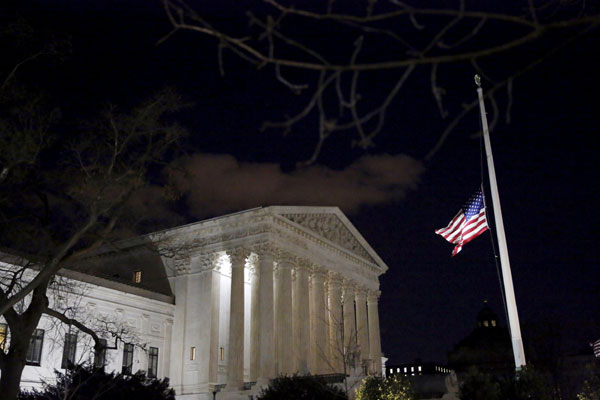US Justice Scalia, conservative icon, dead at 79
(Agencies) Updated: 2016-02-14 09:50
 |
|
The US flag is seen at half mast at the Supreme Court building in Washington D.C. after the death of US Supreme Court Justice Antonin Scalia, February 13, 2016.[Photo/Agencies] |
POSSIBLE REPLACEMENTS
Appointed to the top US court in 1986 by President Ronald Reagan, Scalia was known for his strident conservative views and theatrical flair in the courtroom.
Scalia's replacement would be Obama's third appointment to the nine-justice court, which is set to decide its first major abortion case in nearly 10 years as well as key cases on voting rights, affirmative action and immigration.
Waiting for the next president to make a nomination would leave Scalia's seat empty for at least 11 months, an unprecedented gap in recent decades.
Obama's first two appointments to the court, liberals Sonia Sotomayor in 2009 and Elena Kagan in 2010, both experienced relatively smooth confirmation hearings in the Senate, which was then controlled by Democrats.
This nomination will be different, with Republicans now in charge of the Senate and keen to exert their influence over the process. Obama is likely to be forced into picking a moderate with little or no history of advocating for liberal causes.
Other factors the White House is likely to consider is whether to nominate a woman or a member of a minority group, or someone who fits into both categories.
Among those mentioned within legal circles as potential nominees are Sri Srinivasan, an Indian-American judge who has served on the US Court of Appeals for the District of Columbia Circuit since May 2013, and Jacqueline Nguyen, a Vietnamese-American who has been a judge on the San Francisco-based 9th US Circuit Court of Appeals since May 2012.
Paul Watford, a black judge on the 9th US Circuit Court of Appeals who was appointed in May 2012, and Jane Kelly, a white woman and former public defender who has served on the St. Louis, Missouri-based 8th US Circuit Court of Appeals since April 2013, also have been touted as possible nominees.
It has been nearly 50 years since political wrangling between a president and Senate pushed a Supreme Court nomination into the next administration.
In 1968, Chief Justice Earl Warren made clear his intention to resign and Democratic President Lyndon Johnson sought to elevate then-Associate Justice Abe Fortas, who had been a close confidant. Senate Republicans fought the nomination, claiming "cronyism," and Johnson withdrew it. The appointment fell to his successor, Republican Richard Nixon.






